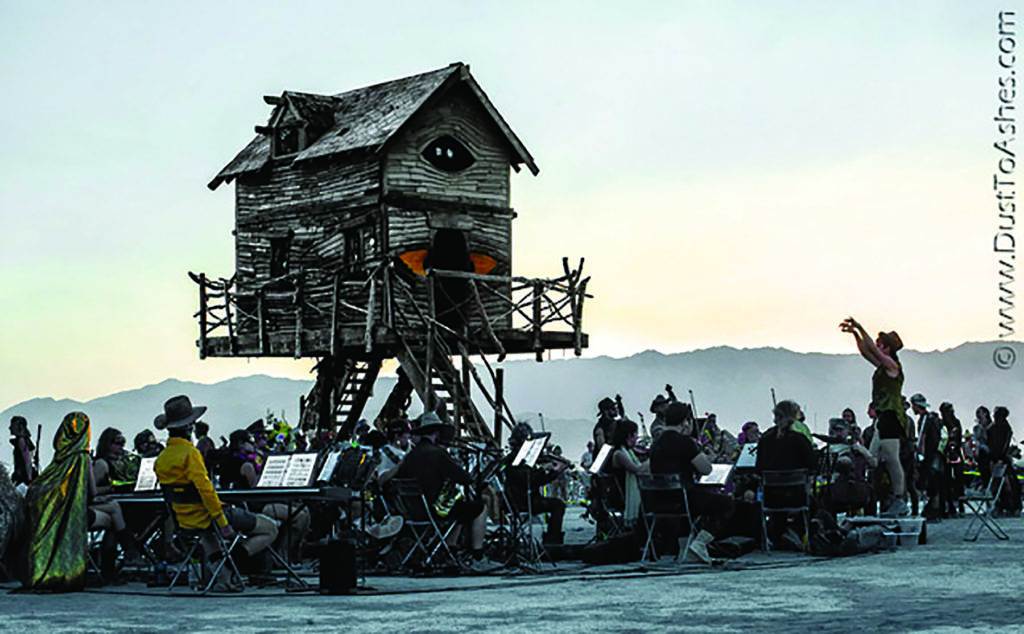What Can We Learn About Better Community Building?
Recently the Burning Man Project, the nonprofit organization that manages the central “Burning Man” event, began posting a series of articles about its impact on the world. But the series’ inaugural post wasn’t about “saving the world” in the grandiose sense. It wasn’t about a major initiative to end famine or racial prejudice. It was about finding a piece of trash, literally the size of a tiny screw, that nobody else was going to find.
The Burning Man Project could certainly talk about heftier impacts. The volunteer “Burners Without Borders” organization alone has organized beach clean-ups, food drives, visits to refugee camps, and disaster relief. The Project’s art program has put community art in small towns and big cities around the world. Burning Man culture has inspired people to develop initiatives and nonprofits that do everything from teaching marketable skills in developing countries to experimenting with alternative community currencies.
But the inaugural post in a series on Burning Man’s impact is a recollection about how, this one time, a guy was so passionate about leaving no trace that he scoured the Playa to find a piece of trash that no one else would have.
Is that myopic? Or is it visionary?
“Saving the world” is the wrong ambition for Burning Man culture. “Saving the world” implies that there is a clear end point, a moment at which, if one can just manage the inputs and the outputs and get people to line up in the right order to do the right things—the world will be saved. Then all the world has to do is hold in that position and stay saved.

That’s a utopian vision, and despite its reputation, Burning Man is not utopian. At all. That’s because Burning Man encourages individuals to find their own intrinsic passion and motivation. And it turns out that the things people want to do when they’re following their passions are often idiosyncratic and unpredictable. When we are not chasing extrinsic motivations like money or status—when we are doing what we love—we often go off the beaten path. Different drummers, to mix metaphors, are different. And different drummers, walking off the beaten path, do not form a squad of people whose inputs and outputs can be easily managed so that they line up in the right order to do the right thing and then hold that position. On the contrary. That’s exactly what passionate people following their bliss don’t do.
Burning Man events are so extraordinarily unpredictable and even chaotic because they are helping people discover and learn to act on their highly personal, idiosyncratic, intrinsic motivations. Because it turns out that learning how to do what you love—following your bliss—is a skill. One that requires practice. And when people do that, things get really interesting in unexpected ways. Burning Man doesn’t have a blueprint to save the world because frankly Burning Man culture encourages people to walk away from preprogrammed blueprints and do what most inspires them. And that’s no recipe for a stable world. Even if Burning Man were to save the world this year, it would do something different next year.
But … but … that’s not the end of the story! Because it turns out that when most people start to follow their authentic passions and intrinsic motivations, one of the things they eventually want to do is create communities—and support them. Burning Man is a three-decades-long social experiment proving this point: As people develop the skills to build on their intrinsic motivations they discover that they value other people more, because most of the things we really want to do require communal effort. The more experience people have creating things they value intrinsically, the more they learn to engage with and support the people around them.
Love. Burning Man demonstrates that doing what you love expands your capacity to love. Communities that help people do that are, in turn, loved and supported by people. Over time it becomes a virtuous cycle.
In other words, Burning Man culture doesn’t create utopias—it has no plan to make the world perfect. But by helping people discover their passions and helping them develop the skills to follow their bliss, Burning Man helps create an army of different drummers, forming communities off the beaten path who make the world both weirder and better, over and over again.
Not perfect, but better. We can’t promise that this will solve any particular problem, but we can confidently say that wherever this process occurs, good things happen.
Burning Man culture believes that this is a better vision than a utopia, and a lot more fun. It believes that we would rather live in communities where people follow their passions and support one another than we would a world where we all follow the dictates of even the most brilliant and enlightened master plan.
To create a better world, you don’t need a big plan or an expensive setup or a special certification. You just need to ask yourself what you authentically want to do for its own sake and start doing it. Out of that, amazing communities and a better world emerge.
The value of Burning Man events is the way they jump start that process, making it accessible to people who don’t know how yet. You learn by doing in an environment where perfect isn’t the goal.
Caveat Magister is a member of Burning Man’s Philosophical Center. Check out his new book, The Scene That Became Cities: What Burning Man Philosophy Can Teach Us About Building Better Communities.